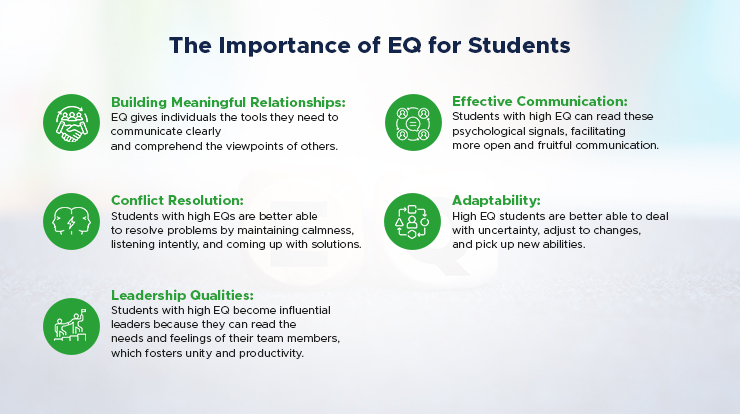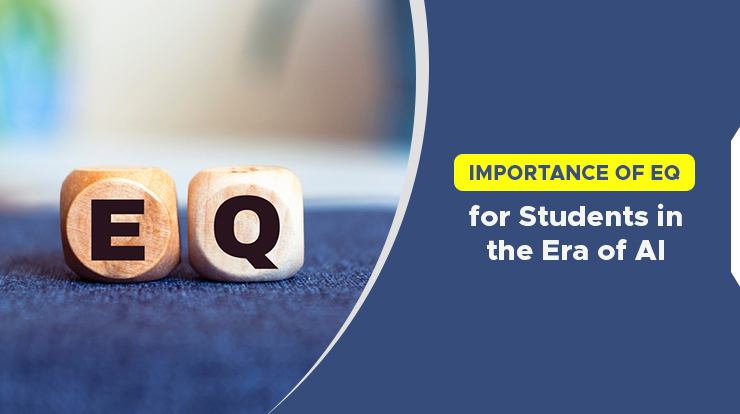In today’s rapidly advancing world, where technology like Artificial Intelligence (AI) is becoming an integral part of our lives, one might wonder what skills are truly essential for success.
While technical skills are undoubtedly necessary, there’s another aspect that holds equal significance – Emotional Quotient (EQ). Especially for students, developing a high EQ has become a crucial factor for personal and professional growth.
So if you are curious to know more about the importance of EQ for students and how to improve EQ, this blog is for you. Let’s explore the significance of EQ in creating a promising future.
Understanding Emotional Quotient (EQ)
The emotional quotient or EQ is the capacity to identify, comprehend, regulate, and make efficient use of both our own and other people’s emotions. Emotions, relationships, and interpersonal skills are the primary subject matter of EQ, as compared to cognitive abilities, which are the focus of the Intelligence Quotient (IQ). It encompasses empathy, self-awareness, social skills, and emotional management.
The Importance of EQ for Students
Is EQ important for students in the age of AI? Prepare Yourself To Compete Against AI. You could ask why technical skills are extremely valuable, and automation is growing. The fact is that although machines are capable of doing jobs quickly, they are not as sophisticated as humans in terms of feelings and understanding. This is the area in which high EQ students succeed.

- Building Meaningful Relationships: Students engage with an extensive number of people as they go through their studies and later stages of life. EQ gives individuals the tools they need to communicate, comprehend the viewpoints of others, and create enduring bonds of respect and empathy.
- Effective Communication: Understanding the fundamental emotions and motivations is just as important for communication as providing information. Students with high EQ can read these psychological signals, facilitating more open and fruitful communication.
- Conflict Resolution: Conflicts always arise in any environment, including the workplace, colleges, and schools. Students with high EQs are better able to resolve problems by maintaining calmness, listening intently, and coming up with solutions.
- Adaptability: AI and automation are changing the nature of work. High EQ students are better able to deal with uncertainty, adjust to changes, and pick up new abilities in a positive way.
- Leadership Qualities: Being a leader involves more than just giving commands. Motivating and inspiring others is the goal. Students with high EQ become influential leaders because they can read the needs and feelings of their team members, which fosters unity and productivity.
How to Improve EQ
The good news is that emotional quotient in students is not a fixed trait. it can be nurtured and developed over time. Here are some effective strategies for students to enhance their EQ:
- .Self-Awareness: Encourage students to spend time reflecting on themselves. They can keep a notebook in which they can record their thoughts, emotions, and reactions to various circumstances. This helps them identify their emotional triggers and behaviours.
- Practice Empathy: Empathy is the foundation of emotional intelligence. Students might try to understand others’ thoughts and viewpoints by putting themselves in their shoes. Volunteering or participating in community service activities can dramatically increase empathy.
- Active Listening: Teach students how to listen effectively. When talking with someone, they should keep their attention on the speaker, avoid interrupting, and offer follow-up questions to demonstrate genuine interest.
- Stress Management: Stress may hinder the development of EQ. Students should acquire stress-relieving practices such as deep breathing, mindfulness, and participating in hobbies that they enjoy.
- Social Skills Development: Encourage participation in group activities or groups to develop social skills. This allows you to interact with people from all backgrounds, practise collaboration, and enhance your social skills.
How to Improve EQ as a Student
As a student, you have a unique advantage – the learning environment itself offers ample opportunities for EQ development:
- Collaborative Projects: Group projects help you learn team dynamics, negotiate tasks, and handle any problems that may develop.
- Feedback Acceptance: Instead of becoming defensive, accept feedback as an opportunity to learn and improve. Constructive criticism is beneficial for self-improvement.
- Mentor Relationships: Seek advice from teachers, seniors, or mentors. These partnerships provide a safe area for people to talk about their problems and receive emotional support.
- Cultural Awareness: Interact with peers from various backgrounds to gain cultural awareness. This broadens your perspective and increases your cultural awareness.
- Reflect on Failures: Failure is an inevitable part of life. Rather than be persistent on it, consider what went wrong, what you learned, and how you may improve the next time.
Conclusion
In the grand scheme of education and personal development, EQ is a treasure that differentiates students and ensures their success in a technologically-impacted environment. As artificial intelligence takes over regular jobs, the unique human ability to connect emotionally becomes a vital advantage.
So students, embrace the power of EQ – it’s not just about being book-smart, but about being people-smart too! If you are thinking of developing the emotional quotient at an initial stage at college, Sangam University is the best choice.
It is the most famous private university in Rajasthan, where you can get the best education while concentrating on developing EQ skills. Contact our team now to know more.
FAQs
1. Why is Emotional Quotient (EQ) important for students, especially in the era of AI?
Technical skills are essential in the age of AI, but they are not a single indicator of success. EQ is important since it focuses on understanding and controlling emotions, whereas AI does not. Students with a high EQ succeed at communication, conflict resolution, empathy, and adaptability, making them well-rounded individuals capable of navigating the difficulties of today.
2. Can EQ be developed and improved over time?
Absolutely! Unlike IQ, which is very stable, EQ is a talent that can be developed and improved. Students can develop their self-awareness, empathy, communication skills, and emotional regulation with practice and conscious effort. It is a continuing process that leads to personal development and improved relationships.
3. How can students enhance their EQ?
Increasing EQ requires a variety of strategies. Students might begin by developing self-awareness through activities such as journaling. Volunteering and understanding the viewpoints of others can help you develop empathy. Active listening, stress management skills, and participation in group activities all help to enhance EQ.
4. How does EQ help students in their academic journey?
EQ has a favourable impact on academics as well as interpersonal abilities. Students with a high EQ are better at managing their time, dealing with academic pressure, and communicating their thoughts well. Furthermore, they can work easily with peers, increasing the success of group projects.


